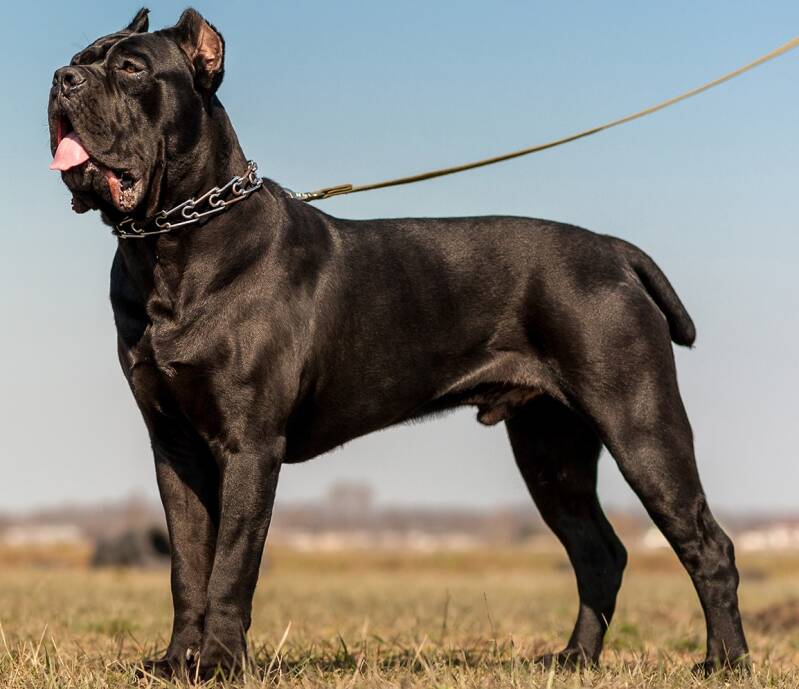CANE CORSO

Life expectancy: 10 – 12 years
Temperament: Reserved, Stable, Quiet, Even Tempered, Trainable, Calm
Height: Female: 23–26 inches (58–66 cm), Male: 24–28 inches (62–70 cm)
Weight: Female: 88–99 lbs (40–45 kg), Male: 99–110 lbs (45–50 kg)
Colors: Black, Chestnut Brindle, Fawn, Grey, Black Brindle, Red
HISTORY / ORIGIN
The Cane Corso was developed in Italy and is said to descend from Roman war dogs. He is more lightly built than his cousin, the Neapolitan Mastiff, and was bred to hunt game, guard property, and be an all-around farm hand. Their work included rounding up pigs or cattle and helping to drive them to market.
The word “cane,” of course, is Latin for dog and derives from the word “canis.” The word “corso” may come from “cohors,” meaning bodyguard, or from “corsus,” an old Italian word meaning sturdy or robust.
The breed declined as farming became more mechanized and came near to extinction, but starting in the 1970s dog fanciers worked to rebuild the Corso. The Society Amatori Cane Corso was formed in 1983, and the Federation Cynologique Internationale recognized the breed in 1996.
A man named Michael Sottile imported the first litter of Corsos to the United States in 1988, followed by a second litter in 1989. The International Cane Corso Association was formed in 1993. Eventually, the breed club sought recognition from the American Kennel Club, which was granted in 2010. The breed is now governed by the Cane Corso Association of America.
DESCRIPTION
The Cane Corso (Corso for short) is a serious dog breed for a person who is serious about having a dog as a companion and who can provide him with the firm and loving guidance he needs to become a great dog. He is a family-only dog. Don’t expect him to buddy up with everyone he meets: He has no interest in people or other animals outside his family, but those within the family will have his undivided loyalty and protection.
Give this dog a job. He’s unwilling to just lie around all day and will find his own “work” to do if you don’t provide it: usually running the fence and barking at passersby, digging holes to China, or chewing up your furniture. If you have a farm or ranch, he will help you with the livestock; otherwise, get him involved in a dog sport such as agility, dock diving, nose work, obedience, or tracking.
TEMPERAMENT
The Corso’s history describes him as having a “vigorous temperament, ready to meet any challenge.” That type of temperament can be a double-edged sword. With a confident, consistent owner who provides good leadership and prevents the dog from roaming, the Corso can be an excellent family dog who is never inappropriately aggressive, but in the wrong hands he can become aggressive and be a danger to the public. In July, two Corsos were in the news after they attacked and killed a jogger.
The ideal Corso is docile and affectionate toward his family, including children. To get him to that point requires socialization and training from an early age. This dog will not do well in a home with anyone who is afraid of or dislikes dogs or is unable to manage a large dog.
The Corso is highly intelligent. Combine that with his bossy nature, and it’s easy to see how he could come to dominate the household without firm leadership and boundaries. He will test you to see how far he can go. It’s important to let him know from the start what the rules are and to ensure that all family members understand the rules as well. Institute a “nothing in life is free” policy by requiring him to perform a command such as “Sit” or “Down” before rewarding him with a meal, treats, or a toy.
Firm leadership does not mean hitting the dog — ever. That not only sends the wrong message but can also be dangerous with a large, powerful dog. The sensitive Corso understands tone of voice and responds well to praise and rewards when he has done something you like as well as to firm, rapid corrections and consistent enforcement of rules when you don’t like what he’s doing. Being calm, quiet, and self-assured will get you a lot farther with this dog than angry bluster. Consistency will allow him to relax and know you are in charge.
Help the young Corso develop confidence by letting him spend time alone. This can be outdoors in a confined area such as a yard or kennel or in his crate while you are busy around the house and can’t supervise. Being alone for varying periods teaches him he’s all right on his own and you always come back.
Like every dog, the Corso needs early socialization — exposure to many different people, sights, sounds, and experiences — ideally before he is four months old. Socialization helps to ensure your Corso puppy grows up to be a well-rounded dog, unafraid of strangers, children, other animals, or being left alone when necessary. Without a lot of experience of the world, he can easily become fearful or aggressive. The more you socialize him, the better able he will be to determine what’s normal behavior and what actions require him to respond in a protective way.
According to the Italian breed standard, the Corso should be indifferent when approached and should only react when a real threat is present. The Corso is a working breed and is required to function under high levels of stress. A Corso who cannot maintain its dictated temperament under stressful situations is one with incorrect temperament for the breed.
HEALTH PROBLEMS
The Corso can be prone to hip dysplasia; eyelid abnormalities such as entropion, ectropion, and cherry eye; demodectic mange (which can be heritable); and gastric torsion, also known as bloat.

